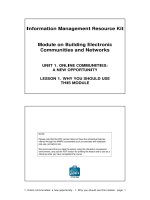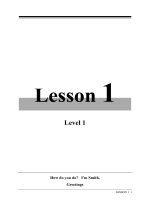Introduction to Information and Communication Technologies: Lesson 1. Why do librarians need to know about ICT and acquire skill in its use?
Bạn đang xem bản rút gọn của tài liệu. Xem và tải ngay bản đầy đủ của tài liệu tại đây (324.53 KB, 17 trang )
<span class='text_page_counter'>(1)</span><div class='page_container' data-page=1>
<b>Introduction to </b>
<b>Information and </b>
<b>Communication </b>
<b>Technologies</b>
</div>
<span class='text_page_counter'>(2)</span><div class='page_container' data-page=2>
<b>Rationale</b>
In Asia, information is recognized as an
important resource but the ICT tools to
create, collect, consolidate and
communicate information are not yet
used in the majority of libraries.
Libraries are seldom included in the
technology vision of institutions
</div>
<span class='text_page_counter'>(3)</span><div class='page_container' data-page=3>
<b>Scope</b>
What are ICT?
What is the impact of ICT on Society?
What is the impact of ICT on the library
and other information centers?
What is the impact of ICT on the
librarian and on library education?
What are the major trends and issues
</div>
<span class='text_page_counter'>(4)</span><div class='page_container' data-page=4>
<b>Learning outcomes</b>
By the end of this lesson, you should be able to:
Identify the impact of ICT on the work
environment in libraries
Realize the impact of ICT on information
formats, access and delivery
Recognize ICT as tools that librarians can and
must use to meet the information
</div>
<span class='text_page_counter'>(5)</span><div class='page_container' data-page=5>
<b>What are ICT?</b>
<b>Information</b>
<b>Communication</b>
<b>Technologies</b>
<b>ICT are the hardware and software </b>
that enable society to create, collect,
consolidate and communicate
</div>
<span class='text_page_counter'>(6)</span><div class='page_container' data-page=6>
<b>Impact of ICT on </b>
<b>society</b>
<i> </i>Developments in ICT have brought
about the merger of the computing,
information, communications,
entertainment, mass media industries
thereby providing a means of
</div>
<span class='text_page_counter'>(7)</span><div class='page_container' data-page=7></div>
<span class='text_page_counter'>(8)</span><div class='page_container' data-page=8>
<b>What is the response of </b>
<b>industry and government to </b>
<b>the information society?</b>
Increased production and availability of
more powerful ICT hardware and software
Provision of more efficient national and
global information infrastructures for more
efficient access and delivery of information
Increased production and publication of
</div>
<span class='text_page_counter'>(9)</span><div class='page_container' data-page=9>
<b>What is the impact of ICT on </b>
<b>the library and other </b>
<b>information centers?</b>
ICT made information creation in
digital format possible.
ICT made online access and file
transfer possible
ICT made networking and sharing
</div>
<span class='text_page_counter'>(10)</span><div class='page_container' data-page=10>
Shift from Print to
</div>
<span class='text_page_counter'>(11)</span><div class='page_container' data-page=11>
<b>Impact of digital </b>
<b>information materials on </b>
<b>libraries</b>
Digital information can be sent in multiple copies
simultaneously over information networks in
fractions of a minute or even of a second. There
is no need for users with PCs attached to the
network to physically go to the library. They can
access information via their PCs.
Digital information can be cut and pasted from
one document into another
Digital information may be free or cheaper than
print equivalents
</div>
<span class='text_page_counter'>(12)</span><div class='page_container' data-page=12>
<b>What are the effects of these </b>
<b>developments on the user </b>
<b>community?</b>
Increases level of technology
literacy
Increases demand for better and
faster access to information
Aggravates discrepancies
</div>
<span class='text_page_counter'>(13)</span><div class='page_container' data-page=13>
<b>What is the impact of ICT </b>
<b>on librarians and library </b>
<b>education?</b>
Need for ICT knowledge
Need for ICT skill
Need for ICT tools
Need for continuous learning in the
context of rapidly changing ICT
<i>Library schools must integrate ICT into their </i>
<i>curricula and short courses to produce </i>
</div>
<span class='text_page_counter'>(14)</span><div class='page_container' data-page=14>
<b>What are the perceived </b>
<b>roles of librarians in an </b>
<b>information society?</b>
<b>Creators: developers and producers </b>
of information products and services
<b>Collectors: librarians, archivists and </b>
records managers
<b>Communicators: information </b>
workers, extension workers, subject
specialists
<b>Consolidators: reference librarians, </b>
</div>
<span class='text_page_counter'>(15)</span><div class='page_container' data-page=15>
<b>What will be the </b>
<b>trends in the </b>
<b>development of </b>
<b>libraries?</b>
The library will :
be networked
be stocked with a core collection
that is multimedia
have access to global information
become digital
</div>
<span class='text_page_counter'>(16)</span><div class='page_container' data-page=16>
<b>Challenges to libraries</b>
Collection
development
Resource sharing
through networking
Faster direct
communication among
scientists and
researchers
Virtual vs. onsite
reference service:
Better document
delivery systems
Better abstracting
and indexing systems
Availability of full-text
materials on the
Internet
Information
</div>
<span class='text_page_counter'>(17)</span><div class='page_container' data-page=17>
<b>Conclusion</b>
Libraries and librarians must cope with the
demands of an information society. Librarians
must have the knowledge, skills and tools in
handling digital information to be efficient
creators, collectors, consolidators and
communicators of information. Librarians with
the knowledge, skills and tools required of
information professionals in an information
society will be the key success factors in
</div>
<!--links-->









